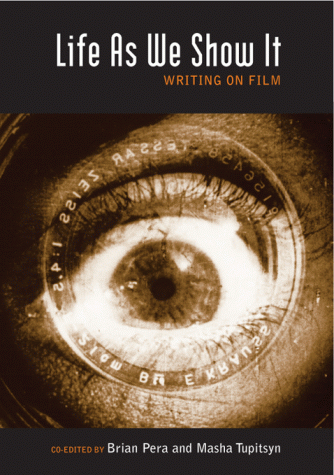
| Jacket 37 — Early 2009 | Jacket 37 Contents page | Jacket Homepage | Search Jacket |
This piece is about 6 printed pages long.
It is copyright © Fanny Howe and Jacket magazine 2009. See our [»»] Copyright notice.
The Internet address of this page is http://jacketmagazine.com/37/howe-f-agoniya.shtml

“After Watching Klimov’s Agoniya”" by Fanny Howe is reprinted from Life as we Show It: Writing on Film, edited by Brian Pera and Masha Tupitsyn, by permission of City Lights Books. You can find out more about the book on the City Lights internet page.
The peasant crosses from the farm to a train
And enters a tunnel to the palace.
The future watches him coming
Like a child whose doll falls from her hands when the living approach.
Ultimately he will be autopsied by nihilists
Who act like God and photograph his corpse.
The state goes on with its grim task of arresting its critics.
“Find me a person, any person, and I will find a way to discredit him.”
What was alcohol for a peasant was heroin for Stalin.
The photographs of Rasputin’s face make me wish I could meet him and vomit.
They are like unwrapped gauzes imprinted with mummies.
His voracious gaze, his wild hair.
They poisoned his cake and wine and shot him and shot him twice.
But he wouldn’t die so they tossed him
Through a hole in the frozen river.
When the police found him, his arms were raised to lift the ice.
People dropped buckets in that superhuman water and drank.
Without an element of atheism, no religion can be credible.
A black frost dapples his face and torso.
They pickled his lingam; it was so long, they wanted to watch it.
He started life as a poor agrarian boy who got in trouble with the authorities.
Then he had a vision and walked from Siberia to Mount Athos.
Now he represents a question. What makes one person
Unable to inhabit his own skin? Once there was metaphysical socialism.
Call it Christianity. Or Gnosticism? Images of munitions
And wolves were sewn into his vestments. Because he was uncultivated,
He was dangerous. A serf, a monk and a drunk haunting the royal family.
We have to face reality.
We are glad we were born in the west. There. We said it.
Shame of embourgeoisement covers us.
Shame on behalf of the women and children who defended their city
Digging trenches in snow, Tarkovsky’s Ivan,
Who lived in rooms smelling of wood and urine. Garlic, salt and black bread for supper.
The fountains play at the western palace from eight to five pm.
The spouts work on a system of gravity that God or someone invented.
This discovering will become important to missile development.
What went wrong when we were young?
We had friends who became enemies of the state with us.
Students who turned into deserters, then returned to capitalism.
All was forgiven. So what did we fail to do then?
Carry through! Reconstruction was the next ideology.
Proud-bellied white men from the west got the last laugh.
Since the invention of the laptop, disconnected figures flow
From discarded works, phrases are resurrected.
Isn’t this blasphemy like showing a saint in ballet tights?
When these four words — You look well fed — are said
You are doomed by your revolutionary companions.
You have no right to complain, having chosen to seek
A piece of the pleasaure.
Some moments in history last too long.
They could have been whims but they became plans.
Beauty is a despised agent for religion under these conditions.
I open my eyes and can’t hear a word from the days of rebellion
But when I close them, I hear “continuing revolution”.
The spoils of a lost war (all wars dry up into scabs)
Have turned libraries upside down and texts are turned into clips.
Every old misery holds interest.
Father got worried when I went to the far left
And called me self-indulgent. Mother laughed
When I became a Catholic. She didn’t believe it. I left the blackened house
And walked in the dark, throwing ballast overboard
For the sake of a future of solitariness.
To the seeker all objects are lonely and dangerous.
Great films begin in chaos.
They are made in order to show the abyss emerging into laws.
Like Pope John Paul, certain directors only want the splendor of truth.
Turgenev wonders if it is possible that all the tears and prayers of people
Can be fruitless? No, he protests. The indifference of nature
Is a foretaste of eternity and its mercy.
On the steps of the Czech embassy in London there is a splash of bird shit.
I sit beside it reassembling the bits of sound for this poem.
Words know everything. That’s why my fingers shake.
Nietzsche was a saint but he made a mistake. He believed in humanity.
Almost everything in that café is weaker than the air that surrounds it.
Glasses hang upside down drying, a mirror reflects the room like an artist
Who is blind to what she is making.
The operation of a Gnostic is pure sex
But love aches its way through the interstices.
Sticks there like a dent in an inchworm’s back.
You can’t take it out because it is the thing itself.
Love is the green in green. Does this explain its pain?
Since love came over and knocked me down,
Then kicked me in the side and fled,
I have suffered from a prolonged perplexity.
God is the object of my wonder and the closest to me.
Especially near sleep. My sheets are like the wings of a guardian angel.
There is no other fabric so close to my feelings.
I haunt a dark cathedral, its single light coming from the gift shop
And follow the priest’s movements, for here is the truth: both worldly
And eternal, a heart of gold in the roaring vault.
Here a weeping Madonna is kissed all day while an old woman wipes away the stain
With a grey cloth. The mass is focused on the resurrection
Not the passion. In this place a grandmother is called white if she has healing powers.
Rasputin had the power in his hands.
Yet Akhmatova shared a train compartment with him and felt faint
Looking at his pale eyes. Each iris, in either eye, saw around the pupil.
I feel sick looking at the photos of his eyes, his penis, beard and blood.
Violent, skinhead, racist, nationalist, sexist illiterate men
Would appreciate him for the wrong reason.
Rasputin played dog and crawled into the royal dining room.
You smell like a mushroom, he barked and called on Jesus
To bless the soldiers who refused to kill the workers.
He was like dry root in motion.
Women loved him and let him achieve ecstasy on top of them.
This was his Gnostic and Tantric obsession. He lived without hate.
He could stop a migraine with his hands and was seen
Praying in a forest for hours on end and by his bed alone.
If only he had never taken up wine.
Now the children climb over the rails around the station.
The siege of renovation raised them, blocks and forests razed
And built on. Cement units they can’t afford to live in.
The kids have behaved like spawn born to be the end of the line,
Or not fully born. Porn-driven thugs, Mafiosi, right wing Christians.
Only hope can save them, or an invasion by Muslims or oceans.
Who are dubbed the New Stupids? The workers!
The revolutionists were long ago strung up and the old did not survive the cold.
You could write music on the waterlines around their flooded tenements.
The peasant mocked institutions that Ratzinger would prize.
It was the student uprising of 68 that turned him against the Left.
Nowadays in every bureaucracy, including the Vatican, there are two of everyone.
Two of each who look exactly alike. It is the softness in the chin
That undefines them. Each one is the half brother of a twin.
Likewise Communism is secular Christianity.
Either you fear or thank someone and stay anonymous.
One poet recreated a new language out of his nanny’s fireside stories.
This way his childhood survived, the way dinosaurs became birds.
While painting takes time and gives headaches,
A digital camera doesn’t blink and this produces a lack of analogies.
It is not an open eye but an impure certainty.
Empty frames stand waiting under the stairs.
They wait for a thought that carried Dante with it, a long and difficult thought
Full of stains and imperfect figures, suffering and acid rain.
Don’t plan any parties for Lent, a man called up in Italian.
And in the dream the shutter kept opening and closing
Like an anemone. Every hour was the same as the one before.
The roads we did not choose began in a town where we were born.
Here a gun might go off,
There perhaps a broom would brush away the sticks of spring.
It was not your fault where you were dropped
Or where you took your first steps.
The red church down the lane, the red sail on the bay—
These had nothing to do with you when you first arrived on earth.
A peasant might prefer smoking weed to whacking at wheat all day.
How else would a vision find and know him?
In a remote fishing village and on its wet stone steps
The clink of the ropes and rings on the boats was the only sound.
Then footsteps. The sun broke through onto buses and houses.
High up, a man and a woman, both old and on their own
Crossed paths without looking. Then she noticed him and he her.
A hurried exchange of recollections followed and half-promises to meet some day.
And then he continued to mount the side of the hill to his house
While she went down to the highway.
Absolutely nothing happened, except recognition.
The sorrowing face of the Theotokos blessed their simplicity.

Fanny Howe
Fanny Howe is the author of over twenty books of poetry and prose including Gone: Poems (2003), Selected Poems (2000), Forged (1999), One Crossed Out (1997), O’Clock (1995), For Erato: The Meaning of Life (1984), and Poem from a Single Pallet (1980). She is the recipient of the 2002 Lenore Marshall Poetry Prize for Selected Poems (2000), and has won awards from the National Endowment for the Arts, the National Poetry Foundation, the California Council for the Arts and the Village Voice. Born in Buffalo New York in 1940, Howe is a prolific poet, novelist and essayist who has won multiple awards for her collections of poetry and novels for young adults. A creative writing teacher of note, Howe has lectured at Tufts University, Emerson College, Columbia University, Yale University and the Massachusetts Institute of Technology. She is Professor Emerita of Writing and Literature at the University of California, San Diego.